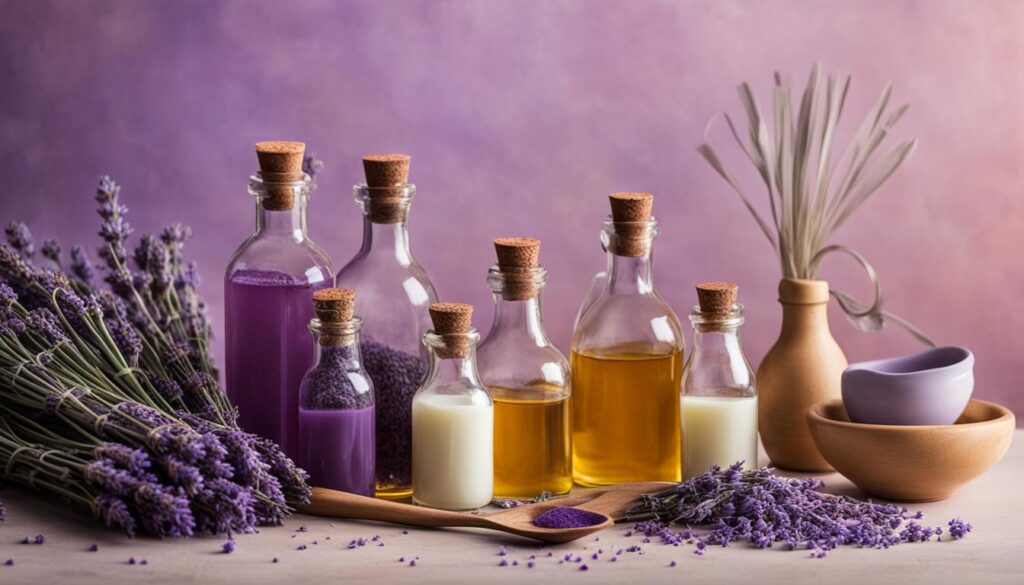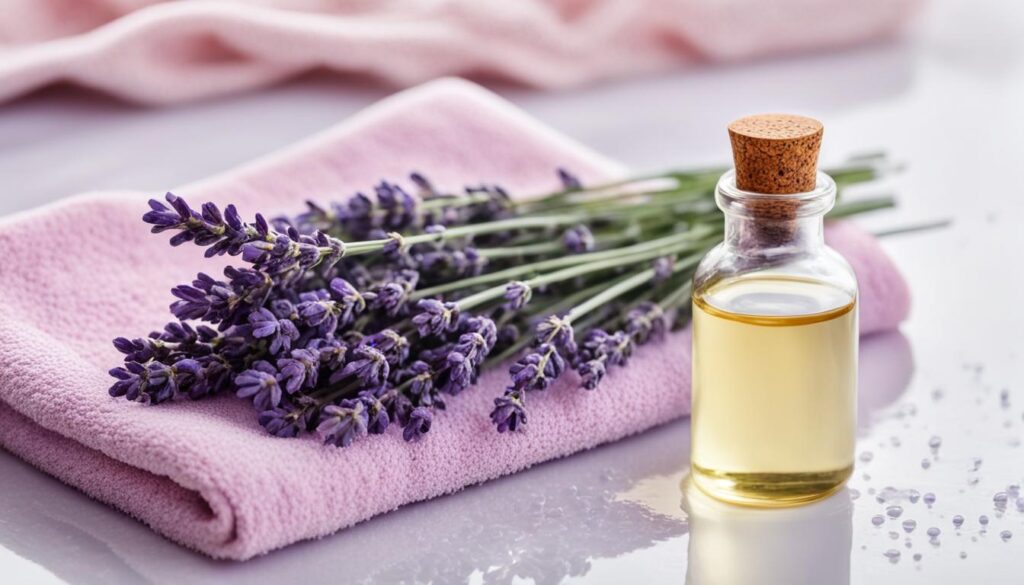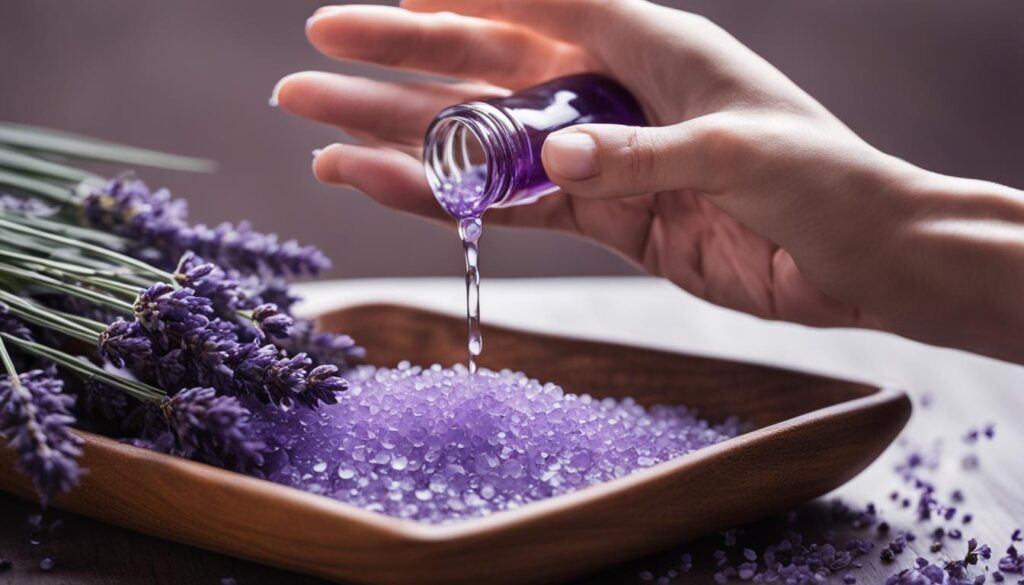Welcome to my article on the various uses and benefits of lavender oil. Lavender oil has been cherished for centuries in different cultures for its remarkable properties. Derived from the lavender flower, this versatile oil is renowned for its therapeutic effects, making it a popular choice for relaxation, sleep, anxiety relief, skincare, and much more. In this article, I will explore the wide range of applications of lavender oil and delve into its fascinating history and properties. Whether you’re seeking stress relief, pain management, or simply a soothing experience, lavender oil is sure to deliver. Let’s explore the incredible potential of lavender oil together.
Key Takeaways:
- Lavender oil offers a multitude of uses and benefits for various purposes.
- It is derived from the lavender flower and contains key components that contribute to its therapeutic effects.
- Lavender oil can be used for relaxation, sleep, anxiety relief, skincare, and more.
- When using lavender oil, it’s important to follow usage tips and cautions and opt for the best quality selection.
- Proper storage will help maintain the potency and effectiveness of lavender oil.
History and Origin of Lavender

Lavender has a rich history that spans centuries and can be traced back to ancient times. This versatile and fragrant plant has captivated cultures around the world, including ancient Egypt, Persia, Greece, and Rome. Lavender’s fascinating journey through history reveals its significance in various aspects of ancient societies.
Ancient Egypt: In ancient Egypt, lavender held a sacred place in their culture. It played a vital role in the mummification process, where its pleasant aroma was believed to protect and purify the deceased. The Egyptians also used lavender as a bath additive to cleanse and rejuvenate the body and mind.
Persia and Greece: Lavender made its way to Persia and Greece, where it further garnered recognition for its medicinal properties. The ancient Persians valued lavender for its healing abilities and incorporated it into their herbal remedies. The Greeks, on the other hand, utilized lavender in their bathhouses and scented their hair, clothes, and homes with its calming fragrance.
Rome: Lavender’s popularity extended into ancient Rome, where it was a coveted commodity. Romans used lavender in various aspects of their lives, including perfuming their baths, clothing, and even their homes. Lavender’s aromatic allure made it a staple in Roman fragrances, promoting relaxation and a sense of balance.
Throughout history, lavender has played a prominent role in herbal medicine. Its natural therapeutic properties have been harnessed by ancient healers to address a wide range of ailments. The medicinal benefits of lavender have been appreciated for centuries and continue to be relevant in modern herbal practices.
“Lavender’s fascinating journey through history reveals its significance in various aspects of ancient societies.”
Properties and Key Components of Lavender Oil

Lavender oil possesses several properties and key components that contribute to its therapeutic effects. These properties make it a versatile and beneficial essential oil for various purposes.
Linalool and Linalyl Acetate:
The main components found in lavender oil are linalool and linalyl acetate. These compounds are responsible for the oil’s remarkable properties, including:
- Anti-inflammatory: Lavender oil’s anti-inflammatory effects make it valuable in reducing inflammation and soothing irritated skin.
- Analgesic: The analgesic properties of lavender oil help alleviate pain and provide relief from headaches, muscle tension, and minor injuries.
- Antimicrobial: Lavender oil possesses antimicrobial properties, making it effective against certain bacteria and fungi.
Terpenes and Phenolic Compounds:
In addition to linalool and linalyl acetate, lavender oil contains various other compounds, including terpenes and phenolic compounds. These additional components contribute to the fragrance and therapeutic benefits of lavender oil.
Lavender oil’s rich composition of terpenes and phenolic compounds enhances its effectiveness in promoting relaxation, reducing anxiety, supporting skin and hair health, and more. The combination of these components creates a synergistic effect, providing comprehensive benefits for both body and mind.
Lavender oil offers a range of applications due to its unique properties and key components. Whether used for relaxation, skincare, or haircare, lavender oil’s therapeutic effects make it a valuable addition to personal care routines and holistic wellness practices.
| Properties | Key Components |
|---|---|
| Anti-inflammatory | Linalool, Linalyl Acetate |
| Analgesic | Linalool, Linalyl Acetate |
| Antimicrobial | Linalool, Linalyl Acetate |
| Fragrance | Terpenes, Phenolic Compounds |
Culinary Uses of Lavender Oil

Lavender oil is not only prized for its therapeutic properties but also for its delightful flavor and aroma that can elevate culinary creations. Incorporating lavender oil in your cooking can add a unique twist to various dishes, desserts, teas, and beverages. However, it’s important to use lavender oil sparingly, as its flavor can easily become overpowering.
Popular Lavender-Infused Recipes
Lavender-infused recipes have gained popularity for their distinct taste and visual appeal. Here are a few examples of culinary creations that incorporate the delicate floral notes of lavender:
- Lavender Cookies: Infuse your favorite cookie recipe with a touch of lavender oil, creating a delightful treat that pairs well with tea or coffee.
- Lavender Lemonade: Add a vibrant twist to classic lemonade by infusing it with a hint of lavender, providing a refreshing zing on a sunny day.
- Lavender-Infused Honey: Drizzle lavender-infused honey over pancakes, waffles, or toast for a sweet and aromatic breakfast delight.
- Lavender-Infused Oils: Create your own flavored oils by infusing them with lavender, offering a unique culinary blend for dressings, marinades, or dipping sauces.
These are just a few examples of the creative possibilities when using lavender oil in your culinary adventures. Let your imagination run wild and experiment with lavender in recipes that complement its distinct flavor and aroma.
Take a moment to visualize the stunning image of lavender fields below, and feel inspired to explore the culinary uses of this versatile herb.
“Cooking with lavender adds a touch of elegance and sophistication to dishes, making them stand out and tantalizing taste buds with its floral notes.”
Incorporating lavender oil in your cooking offers more than just a unique flavor experience. Lavender is known for its potential calming properties, and savoring lavender-infused creations can create a relaxing and peaceful ambiance during mealtime.
| Lavender Oil | Culinary Uses |
|---|---|
| *insert lavender oil benefits here* | *insert examples of culinary uses here* |
Personal Care Uses of Lavender Oil

When it comes to personal care, lavender oil is a versatile and popular choice. Its beneficial properties make it a valuable ingredient in skincare and hair care products. Whether you’re looking to soothe your skin, improve your hair’s condition, or indulge in some DIY pampering, lavender oil has you covered.
Skincare Benefits
Lavender oil is known for its soothing and calming effects on the skin. It has anti-inflammatory properties that can help reduce redness, irritation, and blemishes. Incorporating lavender oil into your skincare routine can help promote a healthy and radiant complexion.
“Lavender oil’s anti-inflammatory properties can help reduce redness, irritation, and blemishes.”
It is commonly found in skincare products such as lotions, creams, serums, and face masks. These products harness the power of lavender oil to nourish, hydrate, and rejuvenate the skin. Lavender oil is especially beneficial for those with sensitive or acne-prone skin.
Hair Care Benefits
Not only is lavender oil great for the skin, but it’s also beneficial for hair care. It can help promote a healthy scalp, stimulate hair growth, and improve the overall condition of your hair.
Lavender oil can be found in various hair care products such as shampoos, conditioners, and hair masks. These products utilize lavender oil’s natural properties to nourish the scalp, reduce dandruff, and strengthen the hair follicles.
DIY Recipes
If you enjoy creating your own personal care products, lavender oil is a must-have ingredient. It can be used in DIY recipes for facial masks, bath salts, body scrubs, and more. The soothing aroma of lavender oil adds an extra touch of relaxation to your self-care routine.
“Create your own DIY facial masks, bath salts, and body scrubs using the soothing aroma of lavender oil.”
Here’s an example of a simple DIY lavender-infused bath salt recipe:
| Ingredients | Instructions |
|---|---|
|
|
Indulging in a lavender-infused bath can help relax your body and mind, leaving you feeling refreshed and rejuvenated.
Household Uses of Lavender Oil
Lavender oil is a versatile and popular choice for household applications. Its natural antimicrobial properties make it highly effective for cleaning and freshening various surfaces in your home. Additionally, its calming aroma can create a relaxing environment throughout your living space.
Here are some of the key household uses of lavender oil:
Cleaning Solutions:
Lavender oil can be added to homemade cleaning solutions to enhance their effectiveness. Its antimicrobial properties help eliminate bacteria and other germs, making it an excellent choice for maintaining a clean and sanitized home. Blend lavender oil with other natural cleaning ingredients such as vinegar, baking soda, or castile soap to create your DIY cleaning solutions.
Air Freshener:
Lavender oil is a wonderful natural air freshener that can eliminate unpleasant odors and infuse your home with a refreshing fragrance. You can create a simple lavender oil spray by mixing a few drops of lavender oil with water in a spray bottle. Use it to freshen up your curtains, furniture, or any area in your home that needs a delightful aroma.
Laundry:
Adding lavender oil to your laundry routine can provide a soothing scent to your clothes and linens. Simply mix a few drops of lavender oil with unscented laundry detergent or add it to a wool dryer ball before starting your wash. Not only will your laundry smell invigorating, but lavender oil may also help promote a sense of relaxation and tranquility when you snuggle into your freshly laundered sheets.
| Application | Description |
|---|---|
| Cleaning | Lavender oil can be used in homemade cleaning solutions to sanitize various surfaces. |
| Air freshener | It can be diffused or used as a spray to freshen the air and eliminate unwanted odors. |
| Laundry | Adding a few drops of lavender oil to your laundry can provide a pleasant scent to clothes and linens. |
With its versatility and beneficial properties, lavender oil is a valuable asset in keeping your household clean, fresh, and serene.
Topical Uses of Lavender Oil

Lavender oil offers a multitude of benefits when applied topically. Its therapeutic properties make it a popular choice for a variety of applications, ranging from direct skin application to massage oils and lotions.
When lavender oil is applied to the skin, it can provide a soothing effect that promotes relaxation, stress relief, and pain management. Its calming properties make it an excellent ingredient in aromatherapy massages and can also be used as a natural remedy for headaches and muscle tension.
For those looking to incorporate lavender oil into their skincare routine, it can be used as part of a facial or body moisturizer. Its gentle and nourishing qualities can help soothe and hydrate the skin, leaving it feeling refreshed and rejuvenated.
When using lavender oil for massage, it can be blended with a carrier oil such as almond, coconut, or jojoba oil. This mixture can then be applied to the body, allowing for a deeply relaxing and therapeutic massage experience. The combination of lavender’s calming aroma and the tactile benefits of massage can create a truly blissful experience.
Benefits of Topical Lavender Oil Application:
- Relaxation: The soothing properties of lavender oil can help promote relaxation and calmness.
- Stress Relief: Lavender oil has been shown to reduce stress and anxiety levels when applied topically.
- Pain Management: Its analgesic properties can provide relief from muscle tension, headaches, and minor aches and pains.
Massage with Lavender Oil:
Using lavender oil for massage can enhance the therapeutic benefits and create a serene atmosphere. Its aroma and relaxing properties can help melt away tension and promote a sense of tranquility. Whether you’re a professional masseuse or simply enjoying a self-massage at home, lavender oil can elevate your experience to new heights.
Remember, when using lavender oil topically, it’s essential to perform a patch test to check for any allergic reactions or skin sensitivities. Dilute the oil with a suitable carrier oil, and if any adverse reactions occur, discontinue use immediately and consult a healthcare professional.
| Topical Uses of Lavender Oil | |
|---|---|
| Relaxation | Lavender oil can promote relaxation and a sense of calmness when applied topically. |
| Stress Relief | Applying lavender oil topically can help reduce stress and anxiety levels. |
| Pain Management | Lavender oil has analgesic properties that can provide relief from muscle tension, headaches, and minor aches and pains. |
Benefits and Applications of Lavender Oil

Lavender oil offers a wide range of benefits and applications. Its natural properties make it a versatile and valuable ingredient in various products and treatments. Whether you’re looking to promote relaxation, improve sleep quality, reduce anxiety, or find relief from headaches and muscle tension, lavender oil has you covered. Additionally, its antimicrobial properties make it effective for skin and wound care, while its ability to support the immune system and reduce inflammation provides further benefits. Let’s explore the numerous applications of lavender oil in detail.
Promotes Relaxation
One of the key benefits of lavender oil is its ability to promote relaxation. The soothing aroma of lavender has been shown to have a calming effect on the mind and body, making it ideal for relieving stress and anxiety. Whether used in a diffuser, added to a relaxing bath, or applied topically with a carrier oil during massage, lavender oil can help create a serene atmosphere and induce a sense of tranquility.
Improves Sleep Quality
If you struggle with sleep issues or insomnia, lavender oil may be a helpful remedy. Research suggests that lavender oil can improve sleep quality, facilitating a more restful and rejuvenating night’s sleep. You can add a few drops of lavender oil to your pillow, create a homemade linen spray, or use a lavender-infused diffuser in your bedroom to create a peaceful environment that encourages deep sleep.
Provides Headache and Muscle Tension Relief
Lavender oil is known for its ability to provide relief from headaches and muscle tension. Its analgesic and anti-inflammatory properties make it effective in soothing headaches and reducing muscle pain and tightness. You can gently massage diluted lavender oil onto your temples for headache relief or apply it to tense muscles for soothing relaxation.
Effective for Skin and Wound Care
Lavender oil’s antimicrobial properties make it a valuable tool for skin and wound care. It can help cleanse and protect the skin from bacteria, making it beneficial for acne-prone skin. Lavender oil also has anti-inflammatory properties, which can aid in the healing process of minor wounds, cuts, and burns. You can apply diluted lavender oil topically to the affected area to promote healing and prevent infection.
Supports Skin Health
In addition to its wound care benefits, lavender oil can also support overall skin health. It can help soothe and calm irritated skin, making it beneficial for conditions like eczema and dry skin. Lavender oil’s antioxidants may also help combat the effects of free radicals and promote a youthful appearance. You can incorporate lavender oil into your skincare routine by adding a few drops to your moisturizer or creating DIY face masks and serums.
Summary of Lavender Oil Benefits and Applications
| Benefit | Application |
|---|---|
| Promotes relaxation | Diffusion, bath, massage |
| Improves sleep quality | Pillow, linen spray, diffuser |
| Provides headache and muscle tension relief | Topical application, massage |
| Effective for skin and wound care | Topical application, wound cleansing |
| Supports skin health | Skincare products, DIY face masks |
As you can see, lavender oil offers a wide range of benefits and applications, making it a staple in many households. Its calming and soothing properties make it a trusted choice for relaxation, sleep, and stress relief. Whether you choose to diffuse it, apply it topically, or incorporate it into your everyday products, lavender oil can enhance your well-being and support your overall health. Just remember to choose high-quality lavender oil and follow proper usage and dilution guidelines for safe and effective results.
Usage Tips and Cautions for Lavender Oil

When using lavender oil, it’s important to follow certain usage tips and cautions to ensure both safety and effectiveness. Here are some recommendations to keep in mind:
- Dilute the oil: Before applying lavender oil directly to the skin, it’s advisable to dilute it in a carrier oil such as coconut oil, almond oil, or jojoba oil. This helps prevent skin irritation, especially for those with sensitive skin.
- Perform a patch test: Conduct a patch test by applying a small amount of diluted lavender oil to a small area of skin, like the forearm. Wait for 24 hours to see if any allergic reactions or skin irritation occur before applying it to a larger area of the body.
- Avoid ingestion: While lavender oil is generally safe for external use, it should not be ingested or taken orally without proper guidance from a healthcare professional. Ingestion can lead to adverse effects or interactions with medications.
- Seek professional advice: If you’re pregnant, planning to use lavender oil on children, or have any underlying health conditions, consult with a healthcare professional before incorporating lavender oil into your routine.
“Using lavender oil properly can ensure its safe and effective utilization.”
Following these tips will help you make the most out of lavender oil while minimizing the risk of any adverse reactions or misuse.
| Lavender Oil Usage Tips | Lavender Oil Cautions | Lavender Oil Safety |
|---|---|---|
| Dilute in a carrier oil | Avoid ingestion | Consult healthcare professional |
| Perform a patch test |
Selecting the Best Quality Lavender Oil
When purchasing lavender oil, it’s crucial to choose the best quality product to ensure its effectiveness and potency. Here are some essential tips to help you make the right choice:
- Look for certified organic and pure lavender oil: Opt for products that carry the certification of being organic and pure. This ensures that the lavender oil has been produced without the use of harmful pesticides or chemicals.
- Check for third-party testing and certification: Look for lavender oil that has undergone third-party testing and certification. This ensures that the oil is free from contaminants and adulterations, guaranteeing its purity and quality.
- Consider the extraction method: The method of extracting lavender oil can have an impact on its quality. Steam distillation is considered the best method, as it preserves the natural properties of the lavender plant and produces the highest quality oil.
- Read reviews and research the brand: Before making a purchase, take the time to read customer reviews and research the brand’s reputation. This will give you valuable insights into the quality and effectiveness of the lavender oil product.
By following these tips and choosing the best quality lavender oil, you can ensure that you are purchasing a product that provides the maximum benefits and meets your expectations.
Proper Storage of Lavender Oil
Proper storage is crucial to maintain the potency and effectiveness of lavender oil. To ensure the longevity of your lavender oil, follow these storage tips:
- Store in a cool, dark place: Keep your lavender oil away from direct sunlight and heat, as they can degrade its quality. Find a cool spot in your home, like a pantry or cabinet, to store the oil.
- Seal the bottle tightly: Prevent oxidation and contamination by ensuring the bottle is tightly sealed. This helps maintain the oil’s freshness and aroma.
- Avoid strong-smelling substances: Lavender oil can absorb odors, so it’s important to keep it away from strong-smelling substances like cleaning chemicals or perfumes.
By following these storage practices, you can preserve the quality and extend the shelf life of your lavender oil.
Lavender Oil Storage Tips:
“Proper storage is crucial to maintain the potency and effectiveness of lavender oil.”
– LavenderLovers.com
Now that you know how to store your lavender oil, it’s time to put it into practice and enjoy its numerous benefits.
| Storage Tips | Do’s | Don’ts |
|---|---|---|
| Temperature | Keep in a cool place, like a pantry or cabinet | Avoid storing in a warm or sunny location |
| Light | Store in a dark place | Avoid exposure to direct sunlight |
| Sealing | Ensure the bottle is tightly sealed | Don’t leave the bottle open or loosely sealed |
| Odors | Keep away from strong-smelling substances | Avoid storing near cleaning chemicals or perfumes |
In Conclusion
Lavender oil, with its long history and diverse uses, is truly a versatile and beneficial ingredient. Its significant health benefits make it a valuable addition to your daily routine. Whether you seek relaxation, better sleep, anxiety relief, improved skin and hair health, or more, lavender oil can deliver.
With culinary applications, you can enhance the flavor and aroma of your favorite dishes and beverages. From lavender-infused cookies to refreshing lavender lemonade, the possibilities are endless.
In personal care, lavender oil proves its worth in skincare and haircare products. Its soothing properties help calm and rejuvenate your skin, while promoting a healthy scalp and nourished hair.
And let’s not forget its household uses, where lavender oil’s antimicrobial properties shine. It can freshen up your home as a natural air freshener and add a delightful fragrance to your laundry.
Topically, lavender oil provides a range of therapeutic effects. From relaxation and stress relief to headaches and muscle tension, it can be your go-to natural remedy.
By following usage tips, selecting high-quality oil, and storing it properly, you can fully experience the benefits of lavender oil. So why wait? Start incorporating lavender oil into your lifestyle today and reap its many rewards.
FAQ
What are the uses of lavender oil?
Lavender oil has various uses, including relaxation, sleep improvement, anxiety relief, skin and hair health, headache relief, stress relief, and pain management.
What are the benefits of lavender essential oil?
Lavender essential oil offers numerous benefits, such as promoting relaxation, reducing anxiety, improving sleep quality, providing relief from headaches and muscle tension, supporting skin health, and aiding in stress and pain relief.
Can lavender oil help with sleep?
Yes, lavender oil is known for promoting better sleep. Its soothing properties can help calm the mind and promote relaxation, leading to improved sleep quality.
Is lavender oil effective for anxiety relief?
Yes, lavender oil is often used to reduce anxiety and promote a sense of calm. Its aroma can help relax the mind and alleviate stress and anxiety symptoms.
How can lavender oil benefit the skin?
Lavender oil has skin-soothing properties and can help with various skin concerns, including acne, eczema, and dry skin. It can support the skin’s natural healing processes and promote a healthy complexion.
Does lavender oil have any benefits for hair?
Yes, lavender oil can be beneficial for hair health. It can help promote a healthy scalp, reduce dandruff, and improve the condition of the hair, making it smoother and shinier.
Can lavender oil be used for relaxation?
Absolutely, lavender oil is often used for relaxation purposes. Its calming aroma and properties help create a soothing environment and promote relaxation and stress relief.
Can lavender oil help with headaches?
Yes, lavender oil is known for its ability to provide relief from headaches. It can be applied topically or used in aromatherapy to alleviate headache symptoms.
Is lavender oil effective for stress relief?
Yes, lavender oil is commonly used for stress relief. Its relaxing properties can help reduce stress and create a calming atmosphere.
Can lavender oil help with pain relief?
Lavender oil has analgesic properties that can help with pain relief. It can be applied topically to soothe muscle aches, joint pain, and minor injuries.
How should lavender oil be used and stored?
Lavender oil can be used topically, inhaled, or added to various products. It should be stored in a cool, dark place, away from direct sunlight and heat, to maintain its potency and effectiveness.






